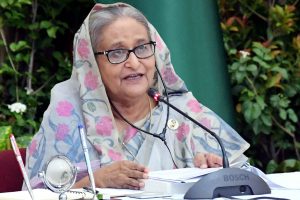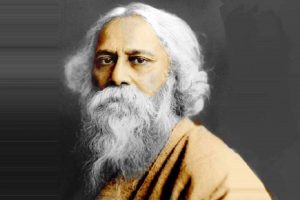When Mohammad Dowwah arrived in Germany, he had never heard of the Berlin International Film Festival, also known as the Berlinale. He certainly didn’t expect to be volunteering at the event, one of the world’s largest cinema festivals, only a year later.“I didn’t know what the Berlinale was,” he says. “I just watched films online. Going to the cinema wasn’t one of my interests.”
Dowwah may seem an unlikely choice to staff the information booth at the entrance to the building, welcoming guests on Potsdamer Platz in downtown Berlin, but the 22-year-old has proven to be a natural at helping confused and sometimes lost festivalgoers in Arabic, English, German and even Russian.
“The Berlinale is really cool,” Dowwah says. “This experience is something new for me.”
The medical student from Damascus learned about the new initiative for young asylum seekers to spend 10 days as an intern at the Berlinale through a friend. The two attended an information session and immediately signed up.
“I am trying to live in the moment. For me, I was always studying medicine all the time for two years,” he explains. “The cinema is something new, so why not try it? That’s how I joined.”
In 2016, 18 asylum seekers from Syria, Afghanistan, Iraq, Palestine and Serbia signed up to be a part of a pilot project: a programme for refugees to volunteer at the Berlinale. The scheme’s goal is to provide the young adults with job experience and an opportunity to practise German.
Coordinators at the festival, one of Berlin’s largest public events, say they feel a responsibility to do their bit to promote the city’s open and welcoming culture.
Alexander Katt, the head of the festival’s internship programme, sees including refugees in the trainee scheme as a positive way to help take care of the Berlinale’s 10,000 accredited guests and 300,000 moviegoers.
“This programme is a good opportunity to help one-and-a-half dozen young refugees to be a small part of our team and sneak into the wonderful world of international cinema,” he told Al Jazeera in an email.
When Katt decided to launch the traineeship, he reached out to the Counselling and Care Centre for young refugees and migrants (BBZ), a place where young newcomers can receive information and support as they adapt to a new life in Germany.
The BBZ and the Berlinale then organised a meeting to explain the programme to potential volunteers. Those who were interested signed up, listing their interests and language skills. The interns were then assigned a placement.
While Dowwah is at the information centre, some volunteers check badges at the different venues around the city. Others hand out Berlinale goody bags to guests. The initiative aims to place only one asylum seeker in each team to facilitate their integration faster and oblige them to speak German with their colleagues.
Tschingis Sulejmanov oversees the partnership between the BBZ and the film festival. He visits the volunteers daily to ensure that there are no problems and, most importantly, that they are enjoying their experience.
“It’s a good opportunity for refugees to get in touch with new things like the Berlinale and to see behind the scenes how they’re organising such events,” Sulejmanov says.
“From the BBZ’s [perspective], this is a really good opportunity for the future. It’s a way for the volunteers to receive job training or even decide if they want to join the film industry. It is also a very good experience to improve their language skills and get in touch with new people.”
Adrienne Boros, the Berlinale’s administration manager, agrees that the Berlinale has a special role to play in integrating newcomers into German society. The festival was, after all, founded in 1951, when millions of Europeans were displaced after World War II.
“We think it’s very important for refugees to get to know everyday life in Germany, and work belongs to everyday life,” Boros says. “That’s the reason we started this activity.”
Katt is pleased with the project’s success thus far.
“In the beginning, it took a while to warm up from both sides, but when the festival started and the people met their crews in a lot of our cinemas and at information counters, we all developed to be a big Berlinale family, regardless of origin and status,” he says. “We hope to develop and improve the programme in the next years.”
Since his placement began last week, Dowwah has already learned a lot about cinema. He spent a few hours speaking about film with Katt one afternoon.
“He told me all about cinema,” he says.
While he spends most of his time at the information desk, Dowwah has also seen a few movies. He speaks about watching Agnes, a film about a love story between a writer and a student, and Fukushima Mon Amour, a story of a young German woman who moves to Japan to volunteer in the aftermath of the nuclear disaster in 2011.
However, he learned the most about Germany, he says, from a movie called Young Light. Set in a mining town, it follows a young boy during his school vacation and his relationship with his father.
“This film talks about real life in another time in German history,” Dowwah explains. “When you know [Germans’] past, you can be closer to them. You learn what your [culture] shares with theirs.”
The Berlinale’s organisers hope that by including refugees, they are introducing German culture to them through the festival.
“That’s what cinema can do: bring you into another world, even if it’s nowadays Germany,” says Boros. “You are sitting in a dark room watching scenes and you are emotionally involved. This kind of emotional involvement is an opening into another society. So we are sure that this kind of cultural participation can build bridges between cultures, peoples and nations. That’s why we are doing it.”
As a newcomer to the world of cinema, Dowwah is pushing himself out of his comfort zone by volunteering at the festival. He is also building new contacts in Berlin.
“I used to be alone with my books and my interests, so I didn’t have much contact with other people,” he says.
“At the information centre, I meet new people and I am in contact with people I don’t know. [Volunteering] broke down this barrier to help me to be more social.”
Most importantly, Dowwah hopes that the placement will help him to break the stereotypes that some Germans have about refugees. Asylum seekers are sometimes accused of coming to Germany to take advantage of the country’s welfare schemes, such as free housing, medical care and a monthly allowance of 364 euros ($404) for an adult asylum seeker.
“I think this programme shows Germans that refugees aren’t only people who sit at home and ask for help,” he says. “Refugees can do something and can help. They are part of this society. This point is important for me.”
Dowwah wants to demonstrate that he can be a productive member of society when allowed to be so. Under German law, asylum seekers are forbidden from working until their application has been approved.
“I think that I can do something for society. If there are programmes and events, they can include these refugees and use their experience and knowledge. We are doctors, engineers – we are educated. We can do a lot.”
His time at the information centre has been positive for Dowwah. He has become adept at answering festivalgoers’ wide array of questions, ranging from ‘Is there internet?’ to ‘What can I do with this badge?’
“I am proud of myself when I answer questions. I can do something,” he says.
After visiting each of the 18 asylum seekers during their internship at the Berlinale, Tschingis Sulejmanov, the refugees’ representative at the festival, believes the programme has been a success and helped humanise the current influx of refugees in Germany.
“Until now, everyone has been nice and talks to the refugees like human beings. It’s really good.”
Dowwah nods in agreement. “No one has asked me if I am a refugee or not,” he says. “I feel welcome here.”
His favourite part of the entire experience has been meeting his colleagues, he explains.
“I have met a lot of great people, especially Alexander Katt and my colleagues, Lukas and Matthias. I really respect them.”
Sulejmanov hopes Dowwah’s placement at the festival will help him to build professional contacts and perhaps even find a job in the future. “I hope [Mohammad] can also – if he wants to work at the Berlinale next year – get a more important position.”
Working with children forms another core part of the Berlinale’s programming. Generation, a special section aimed at including children and young people in discussions surrounding film, has existed since 1978.
This year, groups of 18 to 22 young refugees have been invited to participate. The children watch a movie with their Welcome Class, a special programme for new arrivals who are learning German, then discuss the film’s themes with their classmates, guided by a teacher.
As the head of the Berlinale Educational Project, Martin Ganguly has tried to ensure that refugee children are able to participate in the festival.
“Film and media have a huge impact on the lives of every teenager and young adult in the 21st century,” Ganguly says. “It is a tool for communication without borders. In German curricula, film is an important topic for education. Refugee children deserve the same possibilities to access those communication tools in modern society.”
The Welcome Class was invited to watch Born to Dance, a movie from New Zealand about a young man’s passion for dance despite his father’s disapproval.
Ganguly says that the participants could relate to many of the film’s themes, such as dance as a universal language, the father-son relationship, love and jealousy, and trying to achieve your dreams. These are the subjects they will discuss in their Welcome Class.
“[The young refugees] enjoyed being part of an audience of young people, students and professional adults, experiencing the expression of body language and dance,” he explains. “They also loved taking pictures of the director and the red carpet moments.”




